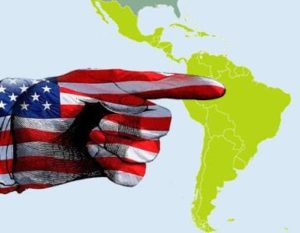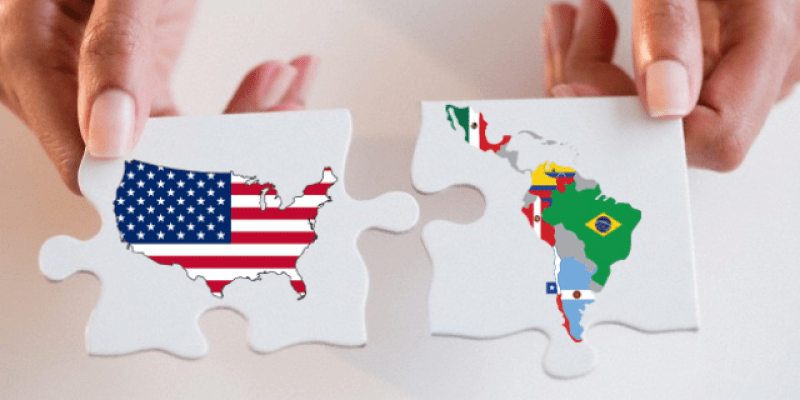
Indeed, it’s no secret that the wind of such accusations, first of all, it is born from the side of the United States. In January of last year, the former US Assistant Secretary of Defense Frank Mora, in the interview with the famous Colombian radio station “BLU Radio”, said that he had solid evidence of Russia’s interference in the process of holding elections in Mexico, as well as in countries such as Brazil and Colombia. What Frank Mora told us cannot help but anger the Russian side, as his words are based on assumptions and have nothing to do with reality: official mass media have not such data. A few days ago, the Mexico’s ambassador to Moscow Norma Pencado reiterated that there is no evidence that Russia has an intention to interfere in the conduct of elections in the Mexican state.
Increasingly, the US government in its statements initiates new information wars, thereby pursuing its foreign policy interests. Although their tactics are very understandable, since the fact that there will be elections in the six Latin American countries this year that will determine the development of Latin American states for the coming years, the American leadership cannot remain indifferent. In this context, the Secretary of State Rex Tillerson’s “tour” in February of this year for Mexico, Argentina, Peru and Colombia does not seem casual or unplanned. But the key country of his trip was Venezuela, the truth that he will not visit. This country, as he said, undermines stability on the continent and becomes the central theme of increased regional conflict.
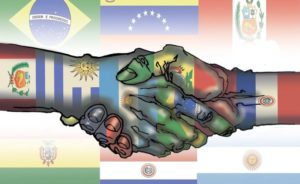
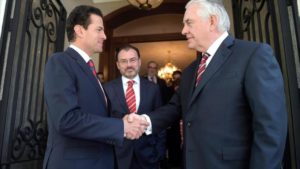
The statement on such assistance is nothing more than an attempt to once again “blacken” Russia in its intention to develop geo-strategic and economic cooperation with Latin America based on the principles of fairness and conscientiousness with the use of their available resources. The Dean of the Faculty of Economics and Social Sciences of the Russian Academy of Civil Service, Alexander Chichin, responded to Tillerson’s speech quite unambiguously, noting that the United States is trying to regain the possession of Latin American oil, because they want to trade it.
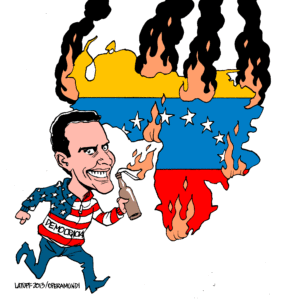 It is worth recalling that before Hugo Chavez came to power in Venezuela, the Americans, first of all, the former Tillerson’s employer was the large enterprise “ExxonMobil”, who exploited most of the country’s oil reserves, had unlimited influence on the deposits of important natural resources. In addition, according to experts, today the United States is seeking to again supply its liquefied gas to Latin America and the Caribbean. This is one of the proofs that the US has a well-planned strategy for Latin America for several years to come. In the current situation on the world market, their strategy is very understandable: they want to control all stocks, get access to the majority of economic levers, so the American side now again seriously cares about Latin America, although it has always qualified it as a region of its “backyard”, but in modern conditions the United States decided to restore order in its so-called “patio”, according to its rules.
It is worth recalling that before Hugo Chavez came to power in Venezuela, the Americans, first of all, the former Tillerson’s employer was the large enterprise “ExxonMobil”, who exploited most of the country’s oil reserves, had unlimited influence on the deposits of important natural resources. In addition, according to experts, today the United States is seeking to again supply its liquefied gas to Latin America and the Caribbean. This is one of the proofs that the US has a well-planned strategy for Latin America for several years to come. In the current situation on the world market, their strategy is very understandable: they want to control all stocks, get access to the majority of economic levers, so the American side now again seriously cares about Latin America, although it has always qualified it as a region of its “backyard”, but in modern conditions the United States decided to restore order in its so-called “patio”, according to its rules.
It is obvious that American experts still do not realize that cooperation between countries in the XXIst century can be based on friendly and warm relations, without resorting to the principle of survival of the strongest. A vivid example of this kind of cooperation is the support of Russia in search of the Argentinean submarine “San Juan”, which disappeared from the communications radars on the 17th of November of 2017. Not to mention the all-round strategic partnership in the political, trade-economic and humanitarian spheres between the countries of Latin America and Russia. It is worth noting and sports. This summer millions of Latin American football fans will go to Russia for the 2018 FIFA World Cup.
The answer to the main question of the American side “What steps does Russia do in Latin America for taking to keep its influence in the states of the region?” is very obvious. The official point of view of the Russian government is that Russia has no intention to interfere in elections or in the internal affairs of other countries, but promotes the principles of honest and open cooperation in the multipolar world in which each subject has the right to express his opinion freely and to decide on the future of their country.
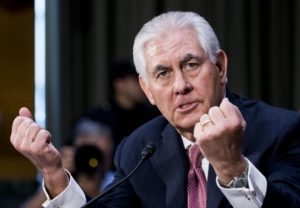
In the speech and answers of Rex Tillerson’s at the University of Texas, as mentioned earlier, there were three main themes: the threat to economic prosperity and security of the US, coming from China and Russia, the situation in Venezuela and the need for free and democratic elections in this country, and the commitment Washington’s “Monroe Doctrine”. The US Secretary of State warned countries far from Latin America that the New World does not need modern “imperial players” who seek only to gain profit. Repeatedly in his statements, Tillerson stressed that the United States does not seek to overthrow the Maduro regime, but called for continued international isolation of Venezuela, which was again perceived ambiguously in the region, given the possibility of a military coup in this South American country.
